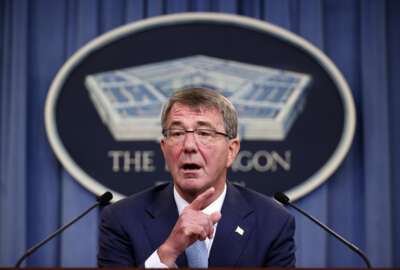
Defense Innovation Board hands over ideas, sees results
The Defense Department is already acting on some of the 11 recommendations the Defense Innovation Board approved Jan. 9.
After spending the last three months visiting military bases and command centers, the Defense Innovation Board made its first attempt to pull the Defense Department’s processes and culture into the modern era.
The board, filled with Silicon Valley eggheads, an astrophysicist and multiple high powered executives, offered 11 ways the Pentagon can promote experimental thinking, hire talented cyber experts and protect weapons systems from hackers.
In October, the board hinted at what kind of recommendations it might provide for the Pentagon, the most high profile being the establishment of a chief innovation officer.
During the Jan. 9 Pentagon meeting, the board officially made that recommendation, along with one to make computer science a core competency in DoD and the military.
The suggestion establishes a career track for computer scientists that will provide incentives for service members to specialize in computer science and programming fields. The hope is the incentives will keep talented cyber civilians and service members with DoD and keep them in those cyber jobs they enjoy doing.
“There was this conversation we had with a young officer who said that he was a cybersecurity expert and so one of the board members asked this young gentleman, ‘How long will you be a cybersecurity expert?’ and he said, ‘Well, for one more year and then I rotate into something else,’” said Eric Schmidt, chairman of the board and executive chairman of Alphabet. “I think he was complaining to us without complaining that that was really stupid.”
The board asked that DoD build a center for studying artificial intelligence and machine learning. The center would work with other universities and military labs in developing and understanding the implementation of the technology.
“This is so important; the defining technologies have shifted over the past decades from when nuclear weapons were the technologies we were way ahead of everybody on,” said Eric Lander, president and founding director of The Broad Institute. “In the coming decades the ability to use massive amounts of data rapidly is going to be one of the most important advantages in any conflict.”
Along those lines the board suggested better communication between the advanced research arms of DoD. The board thought regular meetings between DARPA, the Strategic Capabilities Office, the Defense Innovation Unit Experimental and other agencies should be encouraged to share ideas and best practices.
The Defense Innovation Board also endorsed some more controversial ideas, most notably about intellectual property.
The recommendation stated all systems built for DoD should have their source code made available to DoD and give the department the rights to the code.
“This is not about having the government own code, but being able to access code and being able to build code allows the government to do rapid bug fixes when that is the most expedient way to solve a problem,” said Milo Medin, vice president of access services at Google Capital.
He added that government access to code makes it easier to export data to AI systems.
The right to code has long been a battle between industry and the Pentagon. Companies want to keep their intellectual property, while the government wants things to be more open source in order to enhance cybersecurity.
What’s next
“The key question is what happens now and I’m not referring to the DoD-side, but what happens with our recommendations and how do we make sure they actually happen, are we right or wrong or how do we get feedback? All those sort of operational issues,” Schmidt said at the beginning of the meeting.
Since Defense Secretary Ash Carter took the helm, DoD has been heavily invested in increasing innovation in the department, working with small tech firms and recruiting people with cyber experience.
DoD is already taking some of the board’s recommendations to heart.
In October 2016, Carter announced DoD would create a chief innovation office based on the recommendations of the board. The position’s responsibilities “include building software platforms and human networks to enable workforce-driven innovation across DoD at scale, sponsoring innovation contests and tournaments, and providing training and education that promotes new ideas and approaches to collaboration, creativity, and critical thinking,” Carter said. “Many different organizations have recently embraced this position and also started to regularly run these kinds of innovation tournaments and competitions — including tech companies like IBM, Intel, and Google — and it’s time we did as well, to help incentivize our people to come up with innovative ideas and approaches.”
DoD started conducting interviews with stakeholders in industry to decide what responsibilities the innovation officer should hold.
Joshua Marcuse, executive director of the board, said DoD is working on other board inspired initiatives as well.
DoD is planning on creating a center for AI and machine learning. The department is trying to schedule a meeting between industry, defense labs and universities to figure out better ways to collaborate on AI and machine learning.
The Pentagon started developing proposals for workforce programs like innovation tournaments, Marcuse said.
Despite the interest given to the recommendations by Carter, there is no guarantee incoming President Donald Trump and his Defense Secretary-nominee James Mattis will have the same fascination with innovation.
There was some question as to the future of some positions on the board after Trump’s election. A handful of board members are Trump critics and some even donated to Hillary Clinton’s campaign or gave it a helping hand.
However, the members said they were staying put in their advising capacities.
“I think there is a higher mission statement that we all live by here and expect that that will just continue as some of the most important continuity our country must experience and that is in our defense capacity,” said astrophysicist and board member Neil deGrasse Tyson.
Schmidt said he was happy to continue his role and thought that all, but “maybe” one of the board members would stay on into the Trump administration.
Copyright © 2025 Federal News Network. All rights reserved. This website is not intended for users located within the European Economic Area.
Scott Maucione is a defense reporter for Federal News Network and reports on human capital, workforce and the Defense Department at-large.
Follow @smaucioneWFED




